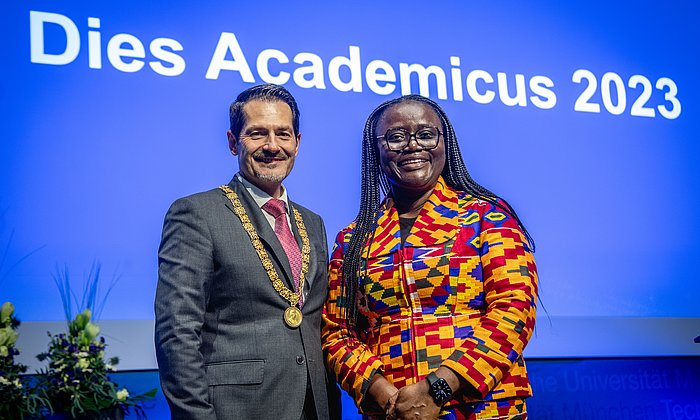Dies Academicus under the motto "Facta non verba - deeds instead of words"
TUM celebrates a successful 2024

President Prof. Thomas F. Hofmann said: "Our top position as the best university in the EU in the THE ranking and the impressive 180 TUM Student Clubs are just two of this year's pleasing achievements. At TUM, we tackle every challenge with fearlessness, team spirit, and the joy of competition."
In his speech, Bavaria's Science Minister Markus Blume paid tribute to TUM's attitude: "The whole of Germany is shaken by crises," he said. The whole of Germany? No, there is this indomitable TUM village, characterized by the spirit of 'just do it'. His message: "The country needs more TUM spirit! Then it will go up again!" TUM embodies the image of modern Bavaria with home and high-tech and puts technology at the service of society for the benefit of the people.
President Hofmann called for increased dialog between science and society: "We find ourselves in turbulent times with new economic and geopolitical realities. However, too many people prefer to spend their time talking others down rather than helping to shape the future themselves. In these times, we, as TUM, are challenged. We need to be less of an 'ivory tower' and more of a truly open university."
Despite global challenges, TUM achieved new records: in rankings, third-party funding, publications, spin-offs and attractiveness for students. Hofmann emphasized the importance of the commitment of the entire TUM family and acknowledged the support of patrons and sponsors: "They give us additional stability and the necessary agility for future innovations."
Johannes Boss, a student representative in the Senate, addressed the tense housing situation in Munich in his speech and appealed to the state government to pay more attention to the Garching campus in particular. At the same time, he praised the enthusiasm and identification of young people with TUM.
Prof. Henrik Dietz from the TUM School of Natural Sciences gave an insight into his research in a lecture on bionanotechnology. His aim is to create programmable DNA molecules and develop new active substances for diseases.
Sarah Fleischer caused particular enthusiasm in the audience with her report on her rocky path as a founder. After two start-up failures, the TUM alumna founded the company Tozero. It is one of the first companies in Europe to be able to recycle lithium-ion batteries - with unprecedented efficiency on an industrial scale. The rate is 97 percent.
Prof. Oliver Hayden and his colleague Nina Santner presented the 1,000+ project. This project aims to bring students and smaller or medium-sized companies into contact at an early stage. In projects, groups of students from all seven TUM Schools deal with real, operational problems and develop solutions together in an interdisciplinary way. After the pilot year 2024 with 14 teams, 44 teams will start in January 2025.
Gabriele Kunnes and Dr. Kathrin Dressel presented the work of the TUM Center for Study and Teaching (CST), which they head, to the guests at the Dies Academicus. Around 120 colleagues take care of all aspects of the approximately 53,000 students here - from application and enrollment to advising during their studies and issuing their degree certificates. Every year, around 50,000 e-mail inquiries and 22,000 telephone calls are received. CST's aim is not only to manage mass processes, but to design them in a service-oriented manner for the benefit of all those involved.
Prizes and awards
This year's Dies Academicus once again provided a worthy setting for several important awards.
Professors Tina Seidel and Enkelejda Kasneci were honored with TUM's highest scientific award, the Heinz Maier-Leibnitz Medal. Vice President Prof. Gerhard Kramer attributed this to establishing the TUM Center for Educational Technologies (EdTech Center). The psychologist and the computer scientist are jointly researching the use of AI in teaching and learning. Their newly developed tools have now been used by over 100,000 people.
The experimental physicist and scientific director of the FRM II research reactor, Prof. Christian Pfleiderer, was also honored with the Heinz Maier-Leibnitz Medal. Vice President Prof. Juliane Winkelmann said that this was in recognition of his outstanding research in solid-state physics as well as his contribution to the founding of the TUM Center for Quantum Engineering (ZQE).
Prof. Lam Khin Yong, Vice President of Nanyang Technological University (NTU) in Singapore, was made an Honorary Senator of TUM for his services as a persistent supporter of the TUM Asia Campus. President Hofmann paid tribute to Prof. Lam's tireless personal commitment to the cooperation between NTU and TUM, culminating in signing a flagship partnership between the two universities in 2024.
The TUM Sustainability Award went to Prof. Stephan Pauleit, the Chair of Strategy and Management of Landscape Development. Vice President Prof. Werner Lang highlighted Pauleit's "pioneering work" in the effort to make cities more climate-friendly. Pauleit emphasized the excellent interdisciplinary cooperation at TUM in the field of sustainability. This makes it possible to find concrete, practicable solutions for urban development.
Maria Laparidou, Pedro Gómez, and Miguel Molina Romero from the start-up Orbem were honored as TUM Entrepreneurs of Excellence. They have developed an imaging method that determines the sex of embryos in the egg and thus prevents the killing of so-called day-old chicks. Laparidou thanked Vice President Prof. Claudia Peus for the award and the "great support" they received from TUM as a founding team.
The Dies Academicus was once again accompanied musically by the TUM JazzBand, which was comprised of students.

Technical University of Munich
Corporate Communications Center
- Ulrich Meyer
- presse@tum.de
- Teamwebsite













![[Translate to English:] Präsident Thomas F. Hofmann beim Dies Academicus 2022. [Translate to English:] Präsident Thomas F. Hofmann beim Dies Academicus 2022.](/fileadmin/user_upload/20221201_Dies_Academicus_AE_-298.jpg)


